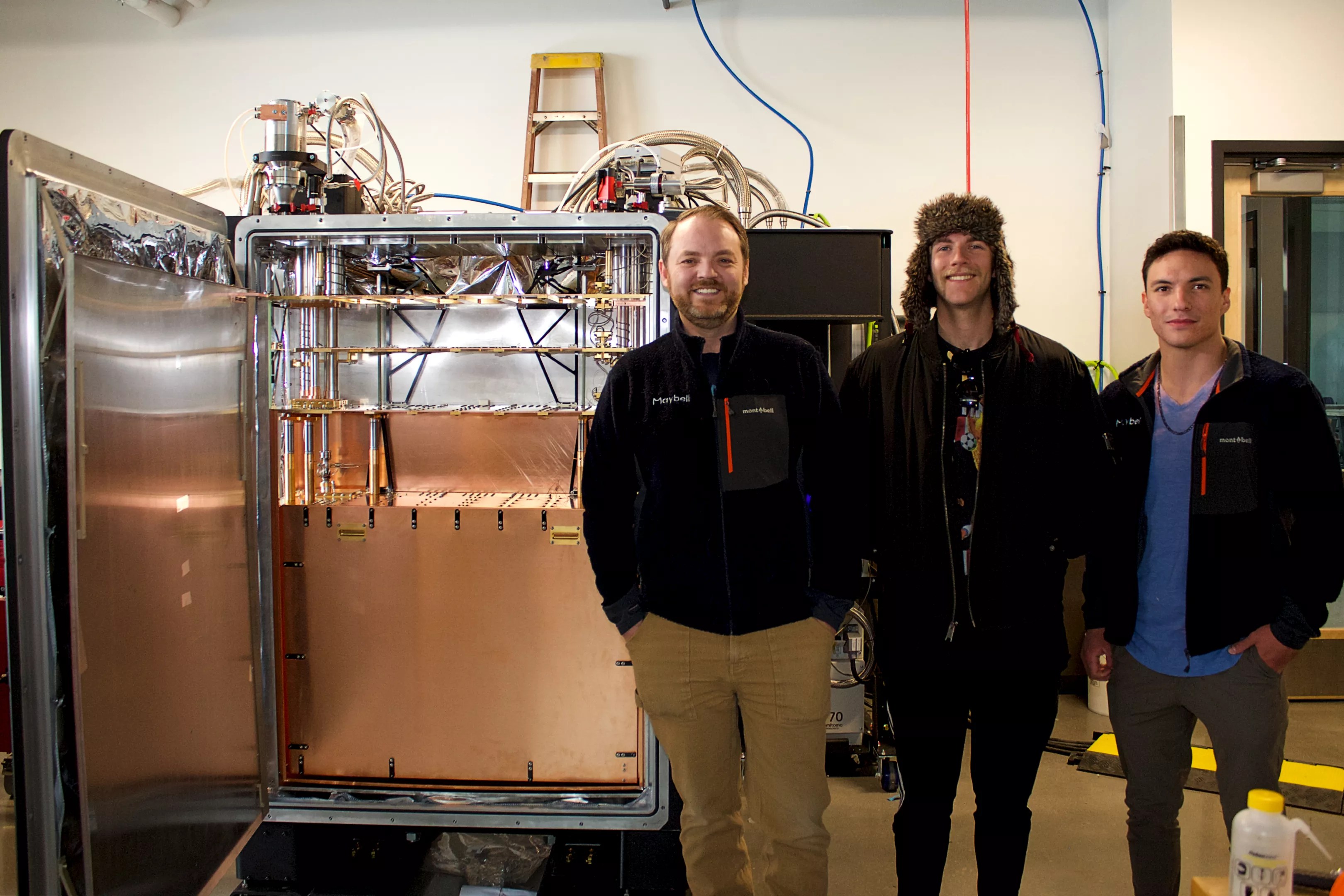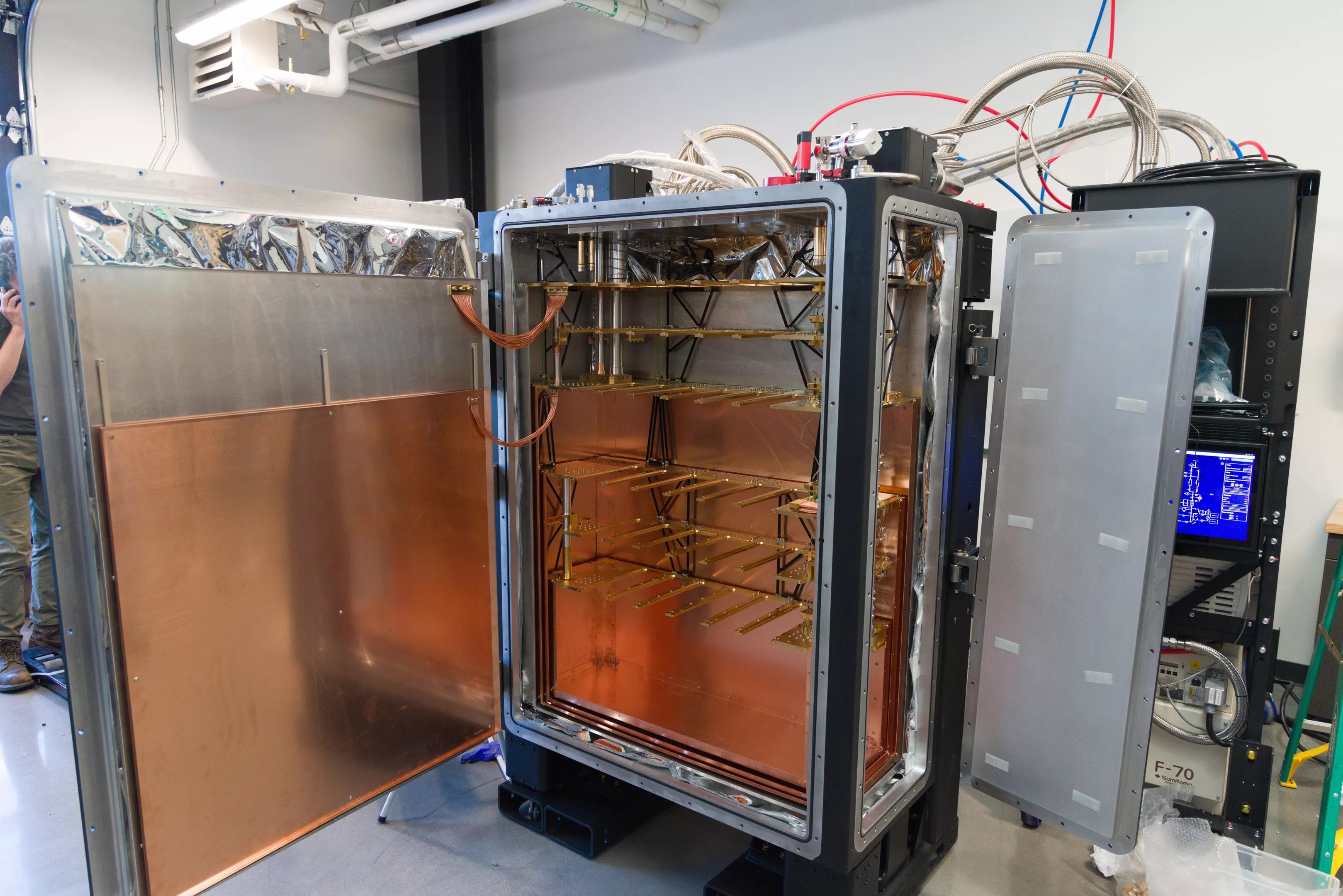
Hannah Metzger

Audio By Carbonatix
To find temperatures 270 times colder than deep space, look no further than Golden, Colorado.
Researchers with Maybell Quantum have developed a new type of dilution refrigerator in collaboration with students and alumni from the Colorado School of Mines. Assembled at the university’s Labriola Innovation Hub, the device can cool to a few thousandths of a degree from absolute zero – more than 330 degrees Fahrenheit colder than the coldest weather ever recorded on Earth.
The dilution refrigerator is designed to house a quantum computer: a machine that uses quantum mechanics to process information, rather than operating based on classical physics as traditional computers do. Experts predict the rapidly emerging technology will soon be able to solve problems faster and more complex than the most advanced supercomputer.
Quantum computing requires ultra-low temperatures to create, maintain and manipulate quantum states because heat causes errors in the quantum bits, or qubits, that the computers rely on.
“When it’s closed up and turned on, [the refrigerator] is the coldest place in the known universe,” says Corban Tillemann-Dick, CEO of Maybell Quantum. “This is the best dilution refrigerator in the world. … It’s a dramatically new paradigm for ultra-low temperature physics.”
The refrigerator is the first of its kind; Tillemann-Dick describes the device as the start of the “next generation of systems.” He says it is easier to use, more reliable, needs less maintenance and is much smaller than prior models, requiring only three nineteen-inch server racks instead of an entire room of tubes and wires.
The device was sold to a research institute in Canada for around $800,000 and will be shipped out in the next few weeks. But by the end of the year, Maybell intends to have distributed dozens of the new dilution refrigerators across the world, including in Japan and throughout the United States.
Right now, quantum computers are merely research tools, but Tillemann-Dick believes that within the next seven years, they will be able to solve some of humanity’s biggest problems.
“The world is going to look fundamentally different because of quantum technology,” Tillemann-Dick says. “We’re talking the end of infectious disease, cure for all cancers, turning back the clock on climate change. The biggest problems that humanity faces, other than people being mean to each other, are going to be solved inside this box.”

Maybell’s new dilution refrigerator, set to be shipped to a Candadian quantum research facility in the coming weeks.
Colorado School of Mines
While experts hope this work will change the world as we know it, for a select group of students at the School of Mines, it was simply a class credit.
Around a dozen Mines students contributed research to the machine as part of their capstone projects, including Ian McGrath, a 22-year-old electrical engineering major in his final semester. Since September, McGrath’s team has worked to develop a “next-generation wiring solution” to fit 10,000 wires in the dilution refrigerator, up from the traditional 1,000 wires, Tillemann-Dick explains.
“Ian’s team is doing truly world-leading work on that right now,” Tillemann-Dick adds. “We are dependent on innovations in the fridge, in the wiring, in the processors themselves.”
“It was between this and goose studies, so,” McGrath jokes about his capstone choices.
The refrigerator project is connected to the School of Mines’ and Maybell’s participation in Elevate Quantum, a consortium of over seventy organizations that works to keep Colorado and the Mountain West a leader in quantum information technology.
Earlier this month, the School of Mines launched a quantum research center in Boulder in conjunction with the University of Colorado Boulder and Colorado State University. Last year, the School of Mines purchased a seventy-acre property in Arvada to create a hub for quantum research innovations. Since 2020, the university has offered one of the nation’s first quantum engineering graduate programs.
“It feels like we’re taking part in a revolution,” McGrath says. “It’s been really enlightening to see how we’re on the very cutting edge of technology. It feels like we’re blazing a new path.”
Joshua Moler, a 24-year-old quantum engineer at Maybell, was part of Mines’ first graduating class of the quantum engineering masters program. He developed the control software for the dilution refrigerator, a project he has worked on for the last year and a half.
“It’s really cool to be contributing to something that actually matters,” Moler says. “Especially coming here straight out of college: a lot of people in that position work on much more trivial tasks that don’t see such a spotlight.”
Tillemann-Dick says student involvement in the project is “critical,” not just for developing the refrigerator, but for building a talent pipeline for Colorado’s quantum industry. This was Maybell’s first time sponsoring a capstone program, which the company plans to continue doing for the foreseeable future.
Colorado is considered the global epicenter of the quantum industry. The U.S. Economic Development Administration designated Colorado’s Elevate Quantum as a national tech hub in 2023, leading to a $41 million federal grant investment. In 2024, state legislators and Governor Jared Polis granted major tax breaks to the state’s quantum industry, including $74 million for Elevate’s new research and development facilities.
Around 3,000 Coloradans currently work in quantum computing, Tillemann-Dick says. With this latest development, more are surely on the way.